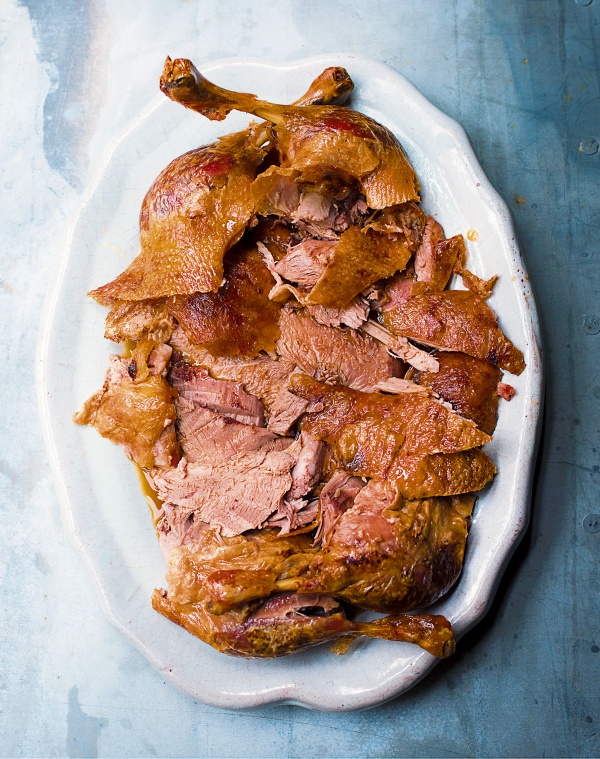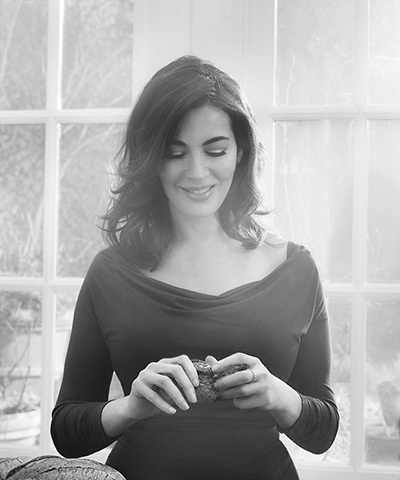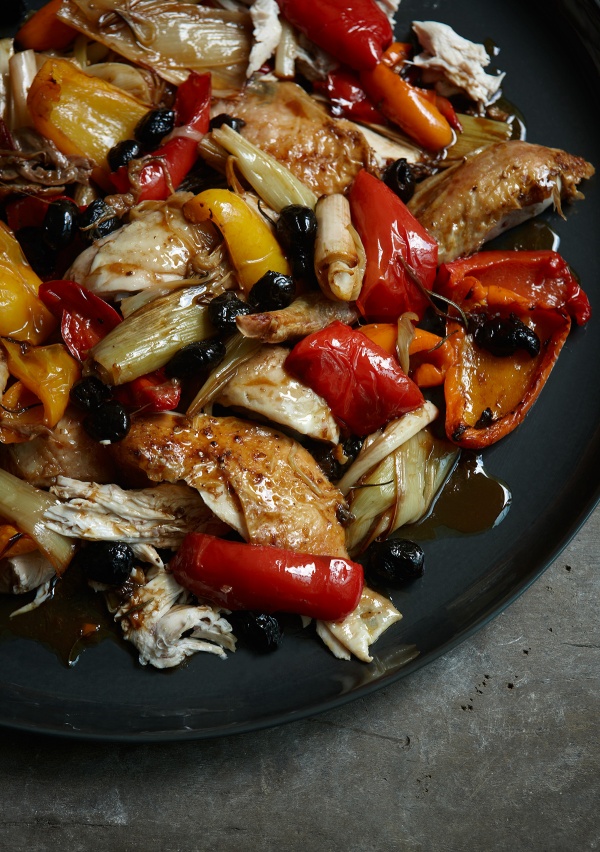Roast Duck with Orange, Soy and Ginger
by Nigella. Featured in AT MY TABLEIntroduction
In How to Eat, I had a method for cooking roast duck that involved poaching them on the stove, letting them cool and then roasting them in a hot oven. It worked, giving tender meat and fantastically crisp skin, but I am far happier with this method, which dispenses with any wrangling of ducks in boiling water. I still take a two-stage approach, but it’s all low-effort, if not no-effort, and the result is meltingly soft meat and superb quackling. You need add nothing to the duck as it cooks, as both meat and sauce — an aromatic broth of a gravy — provide all the flavour that’s required.
In How to Eat, I had a method for cooking roast duck that involved poaching them on the stove, letting them cool and then roasting them in a hot oven. It worked, giving tender meat and fantastically crisp skin, but I am far happier with this method, which dispenses with any wrangling of ducks in boiling water. I still take a two-stage approach, but it’s all low-effort, if not no-effort, and the result is meltingly soft meat and superb quackling. You need add nothing to the duck as it cooks, as both meat and sauce — an aromatic broth of a gravy — provide all the flavour that’s required.

Share or save this
Ingredients
Serves: 4-6
- 2 x 2kg (or 1.8kg without giblets) ducks
- 2 medium smooth-skinned oranges (skin only, finely pared with a vegetable peeler)
- 50 grams fresh ginger (cut into coins)
- 4 star anise
- 5 x 15ml tablespoons soy sauce
- 2 x 15ml tablespoons honey
- 2 x 4½ lb (or 4lb without giblets) ducks
- 2 medium smooth-skinned oranges (skin only, finely pared with a vegetable peeler)
- 2 x 1½ inch pieces of fresh gingerroot (cut into coins)
- 4 star anise
- 5 tablespoons soy sauce
- 2 tablespoons honey
Method
- Take the ducks out of the fridge. Remove and discard the giblets, if the ducks have come with them (or for a cook's treat, fry the liver in butter and deglaze with brandy), then cut off and discard the parson's nose with a pair of scissors and remove any excess fat around the cavity. Leave the ducks to come to room temperature. Lightly prick the skin all over with a cocktail stick.
- Preheat the oven to 180°C/160°C Fan/350°F. Once it's hot, pour water from a freshly boiled kettle into a deep roasting tin, to come about 1cm up the sides, and place a rack on top. Sit the ducks on it, breast-side up, and cook in the oven for 1½ hours. Then take the tin carefully out of the oven and, again, prick the ducks assiduously: you will see the fat bubbling and running out. Using oven gloves for ease, remove the ducks — pouring any liquid collected in the cavities into the tin below — to a couple of baking sheets, or similar, and leave to cool before transferring to the fridge (within 2 hours), where they can stay, preferably uncovered, for a day or two. Once it's cooled down a little, carefully pour the liquid from the roasting tin into a large, heatproof jug and leave to cool, then refrigerate. When the fat's cold and solidified, remove (discarding the water underneath) and store in the fridge to roast with at a later date.
- About 2 hours before you want to roast your ducks, take them out of the fridge and sit them breast-side up, on top of a wire rack sitting over a deep roasting tin, to come to room temperature; they really mustn't have any chill about them. As soon as the ducks are out of the fridge, drop the finely pared orange peel into a small saucepan. Add the ginger, star anise and 500ml/2 cups of cold water and bring to the boil. Let it boil for 1 minute, then turn off the heat and leave to steep for 2-3 hours.
- Preheat the oven to 220°C/200°C Fan/425°F. Lightly price the duck skin all over with a cocktail stick, yet again, and if you're lucky you'll see a few fatty blisters, bubble-wrap style, probably on the underside: if you do, press on them to push out and remove little dots of fat; this is very satisfying work. I know it doesn't sound attractive in the context of cooking, but I have to say it: it is just like squeezing spots.
- Transfer the ducks to the hot oven and roast for 50-60 minutes, turning the tin around halfway through, until the skin is crisp and bronzed. You will get some stippled dark brown patches — that's fine. Remove from the oven and let stand for 10 minutes.
- Before you carve, finish the sauce. Remove and discard the orange peel, ginger and star anise. Add the soy sauce, put the pan back on the heat and bring to the boil, then switch off the heat and stir in the honey to dissolve it. Pour into a warmed gravy boat or jug.
- Carve the breast thinly and remove the meat from the legs or leave them whole as wished, then arrange on a warmed plate, along with any crisp skin that's left on the bird. Spoon a little of the orange, soy and ginger sauce just over the meat. Serve absolutely immediately.
- Take the ducks out of the fridge. Remove and discard the giblets, if the ducks have come with them (or for a cook's treat, fry the liver in butter and deglaze with brandy), then cut off and discard the parson's nose with a pair of scissors and remove any excess fat around the cavity. Leave the ducks to come to room temperature. Lightly prick the skin all over with a cocktail stick.
- Preheat the oven to 180°C/160°C Fan/350°F. Once it's hot, pour water from a freshly boiled kettle into a deep roasting tin, to come about 1cm up the sides, and place a rack on top. Sit the ducks on it, breast-side up, and cook in the oven for 1½ hours. Then take the tin carefully out of the oven and, again, prick the ducks assiduously: you will see the fat bubbling and running out. Using oven gloves for ease, remove the ducks — pouring any liquid collected in the cavities into the tin below — to a couple of baking sheets, or similar, and leave to cool before transferring to the fridge (within 2 hours), where they can stay, preferably uncovered, for a day or two. Once it's cooled down a little, carefully pour the liquid from the roasting tin into a large, heatproof jug and leave to cool, then refrigerate. When the fat's cold and solidified, remove (discarding the water underneath) and store in the fridge to roast with at a later date.
- About 2 hours before you want to roast your ducks, take them out of the fridge and sit them breast-side up, on top of a wire rack sitting over a deep roasting tin, to come to room temperature; they really mustn't have any chill about them. As soon as the ducks are out of the fridge, drop the finely pared orange peel into a small saucepan. Add the ginger, star anise and 500ml/2 cups of cold water and bring to the boil. Let it boil for 1 minute, then turn off the heat and leave to steep for 2-3 hours.
- Preheat the oven to 220°C/200°C Fan/425°F. Lightly price the duck skin all over with a cocktail stick, yet again, and if you're lucky you'll see a few fatty blisters, bubble-wrap style, probably on the underside: if you do, press on them to push out and remove little dots of fat; this is very satisfying work. I know it doesn't sound attractive in the context of cooking, but I have to say it: it is just like squeezing spots.
- Transfer the ducks to the hot oven and roast for 50-60 minutes, turning the tin around halfway through, until the skin is crisp and bronzed. You will get some stippled dark brown patches — that's fine. Remove from the oven and let stand for 10 minutes.
- Before you carve, finish the sauce. Remove and discard the orange peel, ginger and star anise. Add the soy sauce, put the pan back on the heat and bring to the boil, then switch off the heat and stir in the honey to dissolve it. Pour into a warmed gravy boat or jug.
- Carve the breast thinly and remove the meat from the legs or leave them whole as wished, then arrange on a warmed plate, along with any crisp skin that's left on the bird. Spoon a little of the orange, soy and ginger sauce just over the meat. Serve absolutely immediately.
Additional Information
MAKE AHEAD / STORE:
Duck can be steam roasted up to 2 days ahead of final roasting. Make sure that it is refrigerated within 2 hours of steam roasting. Refrigerate leftover roasted duck and sauce, within 2 hours of cooking, in separate airtight containers for up to 1 day. Reheat until piping hot. Duck fat should be transferred to an airtight container and refrigerated for up to 1 week.
FREEZE:
Duck fat can be frozen for up to 3 months.
MAKE AHEAD / STORE:
Duck can be steam roasted up to 2 days ahead of final roasting. Make sure that it is refrigerated within 2 hours of steam roasting. Refrigerate leftover roasted duck and sauce, within 2 hours of cooking, in separate airtight containers for up to 1 day. Reheat until piping hot. Duck fat should be transferred to an airtight container and refrigerated for up to 1 week.
FREEZE:
Duck fat can be frozen for up to 3 months.






Tell us what you think
Thank you {% member.data['first-name'] %}.
Explore more recipesYour comment has been submitted.
What 10 Others have said
-
Posted by Yvonne_Dubai on 30th December 2022
-
Posted by Odelle on 24th December 2022
-
Posted by NerFoodie2019 on 24th December 2022
-
Posted by Morganthecat on 27th December 2021
-
Posted by Rossbeigh on 27th September 2020
-
Posted by wildbill on 21st February 2019
-
Posted by cookghs on 23rd December 2018
-
Posted by eam16 on 5th January 2018
-
Posted by Goldilocks29 on 29th December 2017
-
Posted by Dragonmum on 22nd December 2017
Show more commentsSpent the last few days making this magnificent duck recipe. It is truly the best duck I've ever had. I don't even think it needs the orange, soy and ginger sauce as the duck is so succulent it does fine on its own. We paired it with roast potatoes (also from Nigella's recipes), celery root puree and a spinach salad. Possibly one of the most delicious meals I ever made, thank you so much for sharing this with us Nigella. It's a winner for sure!
A rich decadent spicy moist succulent duck cooked in a delicious spiced orange soy and ginger sauce it looks and tastes fantastic too I'll never roast duck any other way again it's absolutely delicious. Enjoy! Many thanks Nigella on another another winner! Enjoy!
Made this many times. Absolutely bomb proof. Having it again tonight for our Christmas Eve dinner, highly recommended.
This was fantastic. I have roasted a lot of ducks in my day and this was one of the best. I used a D'artagnan Rohan duck (not as fatty as many others), let it sit uncovered in refrigerator for a day before starting the recipe. I loved that it is almost finished prior to the reheating of step #3. Makes entertaining easy and basically fool-proof. The only thing I would change is that I would reduce sauce considerably before serving. Worthy of a fine wine. Wish I could share a glass with Nigella.
This recipe is perfectly written to help people like me who have always been intimidated by roasting a duck. Well done! One side note that I don’t see in the comments is that Nigella’s poaching method outlined here produces a wonderful amount of rendered duck fat, which I refrigerate for months to sauté potatoes and beans and salmon. Duck fat is quite expensive, and here you get at least $15 worth that you can subtract from the price of the duck!
I was going to do this for New Year but here it is late February! I’m very happy the duck is in the oven for it’s first cook. Thank you, very much, for the “cook's tip” regarding a quick sauté on the liver and deglaze with Brandy. Heavenly with a plain toast and glass of Brandy! I have a hunch if I had to choose a “last meal” this would be it!
Tried this recipe today and it is the first time the duck turned out perfectly. Have tried many other methods, however this one is fool-proof and so easy. And the sauce? Outstanding!! I have a feeling the sauce would go well with Maui, or Korean style beef ribs too. Thank you Nigella!
We did the duck recipe today from 'At my Table' absolutely superb.
I tried this recipe yesterday and it worked absolutely perfectly. I was bit hesitant because it seemed a rather unusual method but it was the best duck I've eaten for a long time - tender but with amazingly crispy skin and a sauce full of flavour. Thank you SO much, Nigella xx
My extended family meet up just before Xmas as we are all scattered around Australia on Christmas Day. So I thank you for this recipe, it was a show stopper as everyone said they had never eaten duck which was so moist. The sauce was a hit also, I am already getting requests for this again next Christmas. I did make sure that we all raised a glass to Nigella as thanks for the recipe.